Work Mind Myths
Here are three common myths that may be inhibiting you from reaching your full potential.
Myth 1: "I don't have time to be mindful"
Here's the thing: you don't have time to NOT be mindful. Even ten minutes/day of slowing down and being present with your breath can re-orient how you experience time. When you re-connect with Big Mind, your "to do" list becomes more manageable. Big issues become small issues, insights pop up without excessive analysis, and some problems simply take care of themselves. A common variant of this myth is "I can't meditate. My mind is too busy." That's rubbish. We all have busy minds. You just happen to be very aware of yours, which is great. The part of your mind that is aware of the busy-ness IS the mind of meditation. You don't have to work at slowing down or stopping the thinking. (It's impossible to stop it anyway, nor would you want to.) But the more you bring your mind back to the aware-ing mind, the less fuel the thinking mind has, and then it naturally slows down. Simple (but not easy.)
Myth 2: "I have to multitask (and it works)"
Human brains do not hold focus on more than one thing at a time. What we think is "multi-tasking" is actually rapid shifting between attention-objects. It would be wonderful if this rapid-shifting allowed us to actually advance several tasks in parallel, but unfortunately it is proven to be inefficient, counterproductive, and leads to poor results. The context-shifting takes a toll, and the mind is not allowed to settle into the non-analytical spaciousness of the task at hand. This spaciousness is where the direct, simple, creative solutions are found. For some of us, "wearing many hats" is one of the great attractions of early stage companies, because we get to contribute in a small team in many different ways. But you can only wear one hat a time. (Otherwise you look funny.)
Myth 3: "if i am not doing something, i'm diminishing my company's chances of success"
Ambitious, entrepreneurial, creative and highly-driven people (we know who we are) are all subject to the persistent neurosis that we are not working hard enough. It goes with our emotional territory. As soon as we take investment capital, it motivates us to excel, but it also turbocharges this neurosis. As a result, we feel we need to be coding, designing, developing partnerships, developing IP, protecting IP, hiring, growth hacking, and on and on, continuously. When we fall prey to this affliction of the mind, we make poor decisions and we burn out. Mindfulness practice is about neutralizing this (and many other) neuroses. It is within stillness and silence that problems are resolved, NOT obsessive analysis and over-thinking. It is a common and wonderful discovery among leaders who meditate that the less we speak, the more we say, the less we assert control, the more successful our teams are, and the less we DO, the more gets done!
